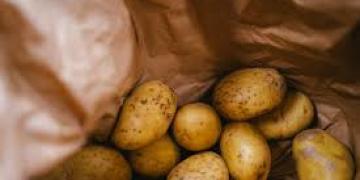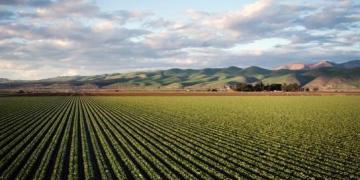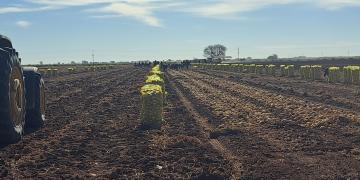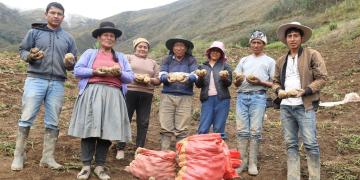EEUU: Nose Knows Scouting’ uses trained dogs to sniff out Potato Virus Y
A North Dakota potato breeder brings in a speaker from Wyoming who has trained a dog to detect potato virus diseases using their nose.
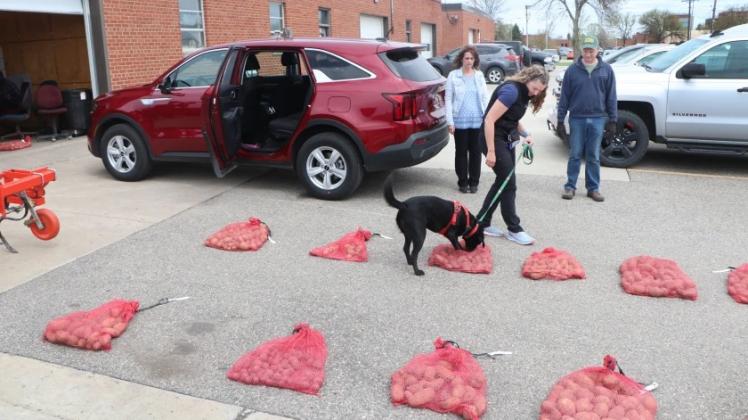
FARGO, N.D. — Good news: the newest high-tech tool for diagnosing crop disease is also man’s best friend — a friendly dog.
Specifically, it’s a crew of five dogs trained by Andrea Parish, 46, of Dayton, Wyoming, owner of "Nose Knows Scouting.” Parish is married to a potato crop consultant and a friend of Asunta “Susie” Thompson, an associate professor and potato breeder in the North Dakota State University Department of Plant Sciences.
A woman walks with her black Labrador, sniffing bags of potato tubers on a driveway, as researchers look on.
Andrea Parish, 46, of Dayton, Wyoming, is trained as a physical therapist. She is married to North Dakota State University graduate David Parish, who consults worldwide for potato growers. Andrea started a business “Nose Knows Scouting,” which uses trained dogs to find Potato Virus Y and other maladies in spuds. Photo taken May 17, 2022, at Fargo, North Dakota.Mikkel Pates / Agweek
Parish and one of her dogs, Zora, flew into Fargo, North Dakota, so that Zora could sniff her way through the North Dakota State University potato seed development program, looking for a potato disease known as Potato Virus Y, or PVY.
052322.AG.Dog Sniffs Potato Viruses03
Andrea Parish, 46, of Dayton, Wyoming, is trained as a physical therapist. She is married to North Dakota State University graduate David Parish, who consults worldwide for potato growers, Andrea started a business “Nose Knows Scouting,” which uses trained dogs to find Potato Virus Y and other maladies in spuds. Photo taken May 17, 2022, at Fargo, North Dakota.Mikkel Pates / Agweek
The NDSU Potato Breeding Program develops new potato cultivars for grower, industry, and consumer adoption, as well as certified seed potatoes of all materials in their breeding pipeline.
NDSU staffers brought potato bags out of coolers for the dog to peruse.
ADVERTISEMENT
Parish and Zora considered each one, as a dozen people looked on.
In a “swirling wind” (not helpful), Zora considered dozens of bags. Top, sides, flipped over, and sniffed again. When she found PVY, she’d go “alert,” behavior — pointing and freezing. She comes off alert when Andrea gives her a “click” or praise.
Onlookers watch as Zora, a black Labrador retriever, and his master, check potato seedstock in bags on a driveway.
A handful of onlookers, including long-time North Dakota State University potato plant pathologist Gary Secor, left, watch as Andrea Parish of Wyoming and Zora, a black Labrador that sniffs out Potato Virus Y, worked over the stored seedstock for the NDSU potato program.Mikkel Pates / Agweek
Zora evaluated NDSU’s entire seed program in half a day. Thompson said it is a tremendous savings of people and resources that can be aimed at other tasks.
Best paw forward
Andrea started training the dogs for sniffing potato disease in 2019.
She is married to David Parish, owner of AIS Consulting LLC, an agricultural consulting business based in Allen, Texas, and specializing in potatoes and operating throughout the world. David grew up in the Chamberlain, South Dakota, area, and graduated from North Dakota State University in biology, and knew Thompson.
Yellow potatoes seed tubers are in a red mesh bag, with an identification tag.
Zora the spud-sniffing dog got a close-up whiff of bags of potato seeds in the North Dakota State University potato breeding program, looking for Potato Virus Y, or “PVY.” Photo taken May 17, 2022, at Fargo, N.D. Mikkel Pates AgweekMikkel Pates
Andrea grew up in potato-rich Maine but had no direct connection with agriculture. She pursued a career in physical therapy. In recent years, she’d been doing accounting for David’s business. But she loved dogs and trained them for search and rescue work and later to help hunters track wounded deer and elk. When her dog had a knee injury, she wondered whether the dog could do other tasks.
She asked husband David if dogs were ever used in potato disease detection.
David said no, and she saw an opportunity. Dogs’ famous schnozzes can be trained to sniff out cadavers and bombs, and lung cancer and COVID-19 in humans, so she figured they could be used for potato disease.
ADVERTISEMENT
“The military has proved over 50 years that it’s the best way to detect small amounts of odor, and (potato) disease gives odor,” she said.
She got PVY virus from Alexander Karasev, a University of Idaho Extension plant virologist, for training.
It takes only about five days to “train odor” for the receptive dog. The best dogs are the longer-nosed, “floppy-eared” breeds. But not all of them are good at it. She had a hound that can track for two miles without stopping but “did not want to” check potatoes for disease. Some dogs don’t like the environment — walking in front of people or being around farms.
The dog is “paid” by access to a tennis ball.
A happy black Labrodor sits happily with its tongue hanging out, in the back of an SUV after the dog has checked potatoes for diseases.
“Zora,” a black Labrador, from the Nose Knows Scouting of Wyoming, has been trained to detect Potato Virus Y (“PVY”) a common disease of potatoes across the nation, saving seed from cross contamination without high laboratory costs.Mikkel Pates / Agweek
She teaches dog obedience, but that training is separate from the odor training.
“I want her to be obedient to odor,” she said. Females “come out working” and seem to do it more quickly.
“To teach it in the environment we’re going to work in takes about three months,” she said. She calls the good dogs the “one-percenters,” she said. "They’re the top 1% athlete in their fields that want to come out and work all the time.”
COVID business
“I was really lucky,” she said. “I had a couple of companies that took a chance on me and hired me and I went to farms and got started.”
ADVERTISEMENT
The first year working she put 100,000 miles on her vehicle and camper and traveled across the U.S. from Maine. She has clients in the upper Midwest but declined to say who, based on confidentiality concerns.
Curiously, the dogs are more accurate identifying the PVY in lower amounts — say, 3% — than when the PVY is more prevalent in the seed, at 30%.
The dogs are capable of finding “volunteer” potato plants in fields, but she prefers to do tubers in seed potatoes.
“We really want to find the disease before you plant, so you don’t ever plant disease, and then it doesn’t get spread,” she said.
In the field, the dogs can detect infected plants that are 4 inches to 6 inches tall, up to 60 feet away.
“We now have PVY and ring rot dogs,” she said. “They can identify the virus in small amounts so they don’t have to core it.”
The client farms are concerned about biosecurity. They provide collars, kennels and other paraphernalia. After the visit, the dogs are bathed and disinfected after the farm visit.
Andrea now lives at Dayton, Wyoming, but she travels and trains among properties in South Dakota, Texas, Maine and Arizona.
Besides potatoes, Andrea said other companies, working off of U.S. Department of Agriculture grants, are working with dogs to find diseases in citrus. Her enterprise is commercial.
Potato grower clients hire Andrea on an annual basis to keep their farms clean. She visits once every couple of months. If they find the virus, the company cleans storages.
“We actually work the plenums,” she said. They teach the dogs to run through the air ducts beneath the storage bins. Once the general location is found, the grower can pull samples for more specifics.
“We take trucks that have seed and run them on a belt (conveyor),” she said. “The dog walks the belt, and identifies the seed. We’re able to pull the PVY seed from large lots while in storage."
She has worked in potato warehouses across the country, from Maine to Washington states.
Among the diseases that could be in the future for the company are: nematodes, potato wart, and powdery scab.
Jennifer Maleitzke, director of communications and external affairs for the R.D. Offutt Company, headquartered in Fargo, was on hand to watch Zora’s work at NDSU.
“If the technology with a dog proves to be successful, it’d be something that we may consider in the future at our seed operations,” Maleitzke said, noting the company does that work at Staples, Minnesota, and Atkinson, Nebraska.
Checking the data
A woman with brown hair in a blue jacket smiles.
Asunta “Susie” Thompson, an associate professor and potato breeder in the North Dakota State University Department of Plant Sciences, in Fargo, is optimistic about whether dogs can sniff out Potato Virus Y and other potato maladies, and is anxious to help compare it to more expensive laboratory verification. Photo taken May 17, 2022, at Fargo, North Dakota.Mikkel Pates / Agweek
Thompson is optimistic about the process but is still evaluating it. The program paid for Andrea and Zora to come.
“We want to be able to match up what her dog found and do some of these ‘grow-outs’ and see how accurate it was,” Thompson said. Besides sniffing the seed tubers, she’d like the dog to come back to check fields and immediately rogue out plants that are positive, and eliminate cross-contamination, or bring infected tubers into storage.
NDSU’s program has a warehouse on the NDSU campus and seed field about 30 miles away near Baker, Minnesota, where they grow out single hills for selection and where they produce maintenance lots for all clones in our breeding program, and generate increase lots of our most promising and advanced selections and “named cultivars” for use in trials conducted by collaborators.
“Many of the more modern or more common strains that we see in fields today are more difficult to detect, visually, with our eyesight,” Thompson said. Her crews “rogue” the fields, looking for disease and other problems. They use a laboratory test to verify PVY, called the “ELISA” test (enzyme-linked immunosorbent assay). This requires using a melon scoop to remove an “eye” from every tuber they want to use in their seed field. On top of that they test the foliage to ensure against PVY.
Of course they can’t check every eye.
Thompson said Andrea is working with other researchers in Colorado, Michigan and Idaho. No research has been published to verify the accuracy, and Thompson is one of the first to volunteer to do that, to share and match up the data.
Andrea has applied for grants to find best process for finding the virus, ultimately to create a “standard” for seed certification using dogs.
Ultimately, she’d like three or four teams of certified trainers across the country, where virus and bacteria problems are prevalent and have dogs and handlers (possibly retired military trainers) on hand who can use the dogs to clean seed and help farmers succeed.
“I’d like to clean lots of potatoes so that people doing have to throw them away,” she said. “We spend, you know, a million dollars to develop a breed and then it gets PVY and they throw it out.”
Fuente: https://www.agweek.com/business/nose-knows-scouting-uses-trained-dogs-to-sniff-out-potato-virus-y

